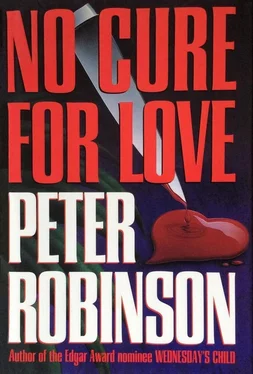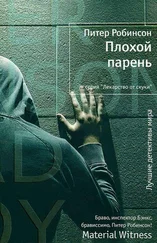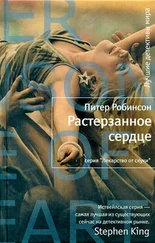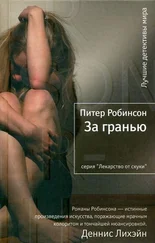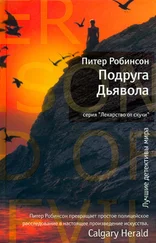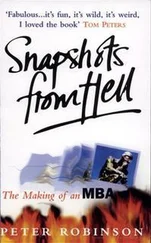So far, she hadn’t seen either her father or Cathy and Jason. They hadn’t known what time Paula and Sarah would get back from the airport, so they had left a note saying they’d gone to visit a neighbor and wouldn’t be long.
Sarah had felt so tired that Paula had packed her off to bed immediately with a cup of tea. It was still there on the bedside table, only half drunk. Sarah slid her hand out and touched it. Cold. She huddled under the duvet again and closed her eyes.
Even though she now knew where she was, Sarah still felt disoriented. Too restless to go back to sleep, she turned over and stretched, arching so her fingers scraped the wall above her. That felt better.
She pulled back the sheets and went to open the curtains. Outside, it was getting dark. The rain had stopped and the sky looked like a dirty dishrag slashed with charcoal. The slate-colored sea sloshed heavily against the rough stone wall at the bottom of the garden. It was a sea view, all right, but light years away from the one she was used to, where bright sun bleached the vanishing point of water and sky.
Sarah turned the bedroom light on and took stock of her surroundings. Everything was fresh and clean, of course; that would be Paula’s doing. There was even the old framed print of Atkinson Grimshaw’s Park Row, Leeds 1882 from the old house in Barnsley hanging on the wall opposite her bed. Paula knew Sarah had always loved it for its eerie moon and sky and the cobbles and tramlines all wet and shiny after rain. She must have put it there specially.
In the small bookcase beside the wardrobe were Sarah’s old books. She hadn’t looked at them for years and hadn’t even known they had survived the move from Barnsley: childhood favorites like Black Beauty and The Secret Garden; Enid Blyton, mostly the Famous Five and the Secret Seven; some girls’-school and nurse stories; and one or two Mills and Boon romances.
Then came the Romantic poetry of her early teens — Keats, Shelley, Byron — followed by the plays she had read first at home then studied later at university — collections by Shakespeare, Ibsen and Tennessee Williams, along with well-thumbed copies of The Duchess of Malfi, Three Sisters and A Dream Play .
Hanging from a hook at the back of the door was the red knitted Christmas stocking her mother had made, with her name, Sally, embroidered in white. Paula must have dug it out. Perhaps her family really did want her here for Christmas after all.
Everything was quiet downstairs. Either they were still out or Paula was hushing everyone up so Sarah could sleep. Time to unpack.
Sarah hefted her suitcase onto the bed and unfastened it. Clothes and presents spilled out, and there, stuck in among them all, was the letter. She hesitated, then reached out and picked it up. This one had no stamp; it had been delivered by hand.
Just then, she heard a door bang downstairs, followed by the clamor of children’s voices. Jason called out her name. Paula told him to be quiet. Time to enter into family life again.
Sarah’s heart leapt into her throat. She had never felt so nervous, even before going on stage for a first night. She looked at the letter again and dropped it back among the pile of clothes, half pleased that she had been interrupted before opening it. After all, she was in England now, thousands of miles away from her problems in LA.
She pulled on her jeans and sweatshirt, then opened the door and started down the worn stone stairs.
What she saw made her stop halfway.
Illuminated by the hall light, a man slumped in a wheelchair at the bottom of the stairs. Beside him, attached to the chair, stood a small tank, like the kind frogmen wear, from which a transparent tube ran to his nostrils. His shoulders sloped and his body looked emaciated under the thick woollen blanket. Bluish flesh sagged and wrinkled over hollow, bony cheeks and scared, bright, feverish eyes looked up at her. Even from halfway upstairs, she could hear the soft hiss of the oxygen and the struggle as he labored for breath.
White-knuckled, she gripped the banister and took a faltering step forward. “Hello, Father,” she said.
I hear your actress found a body on the beach,” Maria said. “Think there’s anything in it?”
Arvo shook his head. “I doubt it. Just unlucky, I guess. On the other hand... ”
“What?”
“I don’t like coincidences, that’s all.”
“So what’s she like?”
“Who?”
“You know. The actress. Sarah Broughton.”
“You watch that show?”
“Sure do.”
Arvo shook his head slowly. It was late Friday afternoon, and Maria was sitting opposite him. He hadn’t seen her since the Sandi Gaines intervention. The only other team members in the office were Eric Mettering and Kelly Norris, one of the three females on the unit.
“Me, too,” Kelly called out from the far hutch. “That Jack Marillo guy’s got a great bod.”
Maria laughed. “So tell me about her,” she insisted. “What’s she like? In the flesh?”
In the flesh, Arvo still thought that Maria herself was as desirable a woman as he had ever met, though he hadn’t told her that, and just about the opposite physical type to Sarah Broughton.
They were different as day and night. Maria’s sexuality was sensual and earthy, while Sarah Broughton’s was more cerebral. While lovemaking with Maria would be joyous and uncomplicated, Arvo imagined, with Sarah it would mean searching for and freeing repressed emotions, finding ways through barriers and other defenses. Maria’s skin would be warm, would offer friction and texture to the touch, he thought, whereas Sarah’s would be as smooth, and possibly as cold, as marble.
“What kind of question is that?” Arvo asked. “‘What’s she like?’”
“A pretty simple one, I’d’ve thought,” said Maria. “Is she pretty?”
“Of course she’s pretty. She’s a TV actress.”
“They’re not all pretty,” Maria countered. “Especially the Brits. Some of them are downright plain and homely.”
“They’ve all got crooked teeth,” Kelly chimed in.
“Okay, so her teeth are a bit crooked,” Arvo said. “So what? So are mine. Does it mean you can’t be pretty if you’ve got crooked teeth?”
“You think you’re pretty, Arvo?” Maria asked with a mischievous smile.
“That’s not what I said. You’re misinterpreting me. What I said was—”
“I know what you said. So you think she’s pretty?”
“Sure she’s pretty, in a cool sort of way.”
“What does that mean?”
“You know, she’s blond, pale complexion, has that accent.”
“You think she’s frigid, is that it?”
“No, I didn’t say that. Look—”
“So she’s sexy as well as pretty?”
“I guess so.”
“Guess so? Come on, Arvo, you can do better than that.”
“Okay. Yeah. She’s sexy. All right?”
“How sexy?”
“Just sexy.”
“No need to blush.”
“I’m not blushing.”
“Yes you are,” yelled Kelly.
“What about her personality?” Maria asked.
“General impressions?”
“Well you hardly know her intimately. Or do you?”
“She’s an actress. You know actresses. She was partly in character. The cop she plays.”
“Anita O’Rourke,” Kelly chipped in again.
“That’s the one.”
“So,” Maria went on, “you’re saying you didn’t get a real good sense of her?”
“She’s very reserved.”
“Sounds like a typical Brit.”
“I guess so,” he said. “But I think she’s scared, too.”
“Maybe she’s got good reason to be. What’s your sense of the guy who’s writing the letters?”
Читать дальше
